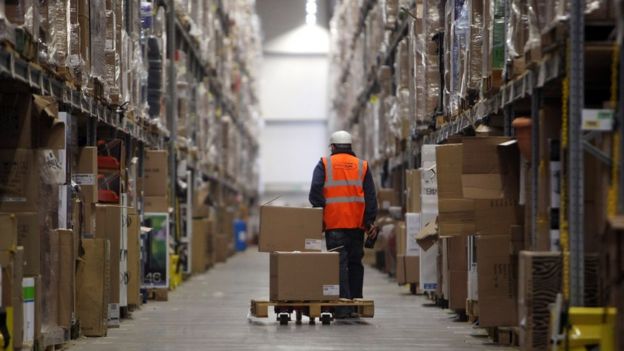
Barclays has faced a backlash after it piloted a system that tracked the time employees spent at their desks. The company has since scrapped the system - but how common is workplace surveillance and what lengths are employers allowed to go to monitor their staff?
Barclays says the computer monitoring software was intended to tackle issues such as individual over-working, as well as raise general productivity.
As well as tracking the computer activity of workers, the software firm, Sapience, says it also determines when an employee goes offline.
The story was first reported by City AM, which said the system told staff to avoid breaks and had warned one staffer they had "not enough time in the Zone yesterday".
In 2017 Barclays also faced criticism after installing heat and motion devices to check whether desks were being used. It said the aim was to assess use of office space.
Many large companies use "non-traditional" monitoring techniques, according to research firm Gartner. That can include analysing emails, computer usage and employees' movements around the office.
Companies usually say their motives are innocent - but some cases have seen concerns raised that these tools could be used to spy on employees.
For example in 2016, the Telegraph newspaper withdrew devices that monitored when people were at their desks after the National Union of Journalists accused it of "Big Brother-style surveillance". The company said the sensors were installed to find out which desks were occupied and improve the office's energy efficiency.

Image copyright Getty Images
Image caption An undercover employee at one Amazon warehouse had his work-rate tracked
Amazon has also faced scrutiny over how its warehouse workers are monitored.
A BBC investigation in 2013 found scanners in the company's Swansea warehouse were tracking the rate employees collected orders. An undercover worker was told he could face disciplinary action if he did not work fast enough.
And in 2018 it was revealed the company had patented designs for a wristband that could track where warehouse employees were placing their hands. Amazon said the idea, if implemented, would be to help track products and free up employees hands from scanners.
Personal data - information about someone who is identified - is protected under the Data Protection Act.
The act says the data should be used fairly, lawfully and transparently. It should be for a specified purpose and should not be kept for longer than necessary.
Before monitoring of employees starts, employers should ensure staff are aware, guidance from the Information Commissioner's Office (ICO) says. Staff should be told the reasons and how the information collected could be used.
The ICO also advises employers to consider the potential negative effects on staff and whether there are less intrusive alternatives.
Employment lawyer Max Winthrop says transparency is key. If an employer is using data gathered from monitoring workers - for example to find out how productive they are - as the basis for disciplinary action, this should be in the employees' contracts.
However, he says employees cannot necessarily expect the same level of privacy in the workplace, for example when using a work computer, as outside of work.
Trade union body the TUC has warned that things like monitoring toilet breaks and tracking workers' movements creates "fear and distrust".
It says any monitoring should be agreed with employees, not imposed upon them.
A 2018 survey by the TUC of more than 2,000 people found attitudes to workplace surveillance depended on its nature.
For example, tracking the location of company property, such as vehicles, laptops and phones was considered unacceptable by fewer than a quarter of those surveyed.
But the use of facial recognition software and monitoring social media use outside working hours was considered unacceptable by about three-quarters of employees.
The union says surveillance can sometimes have benefits for employees. For example, tracking the location of staff can give them greater security and recording of calls can give staff protection against customer complaints.
However, Edward Houghton, head of research at the Chartered Institute of Personnel and Development, says surveillance technology can "cause more harm than good" as employees may feel they are not trusted to do their work effectively.